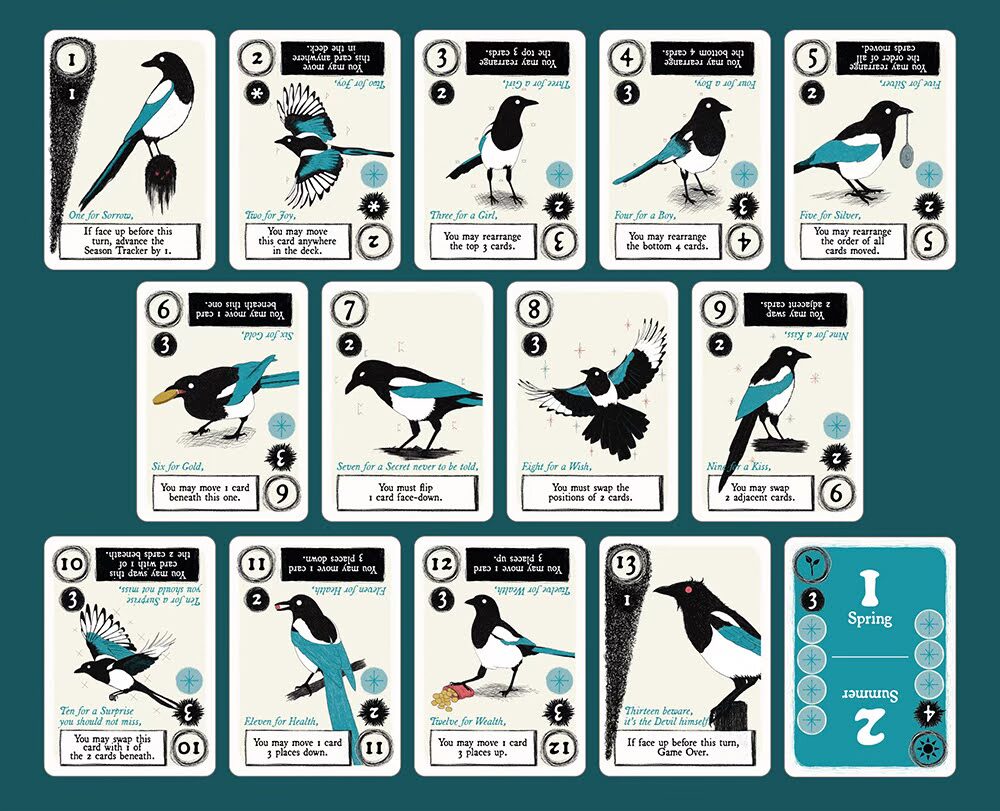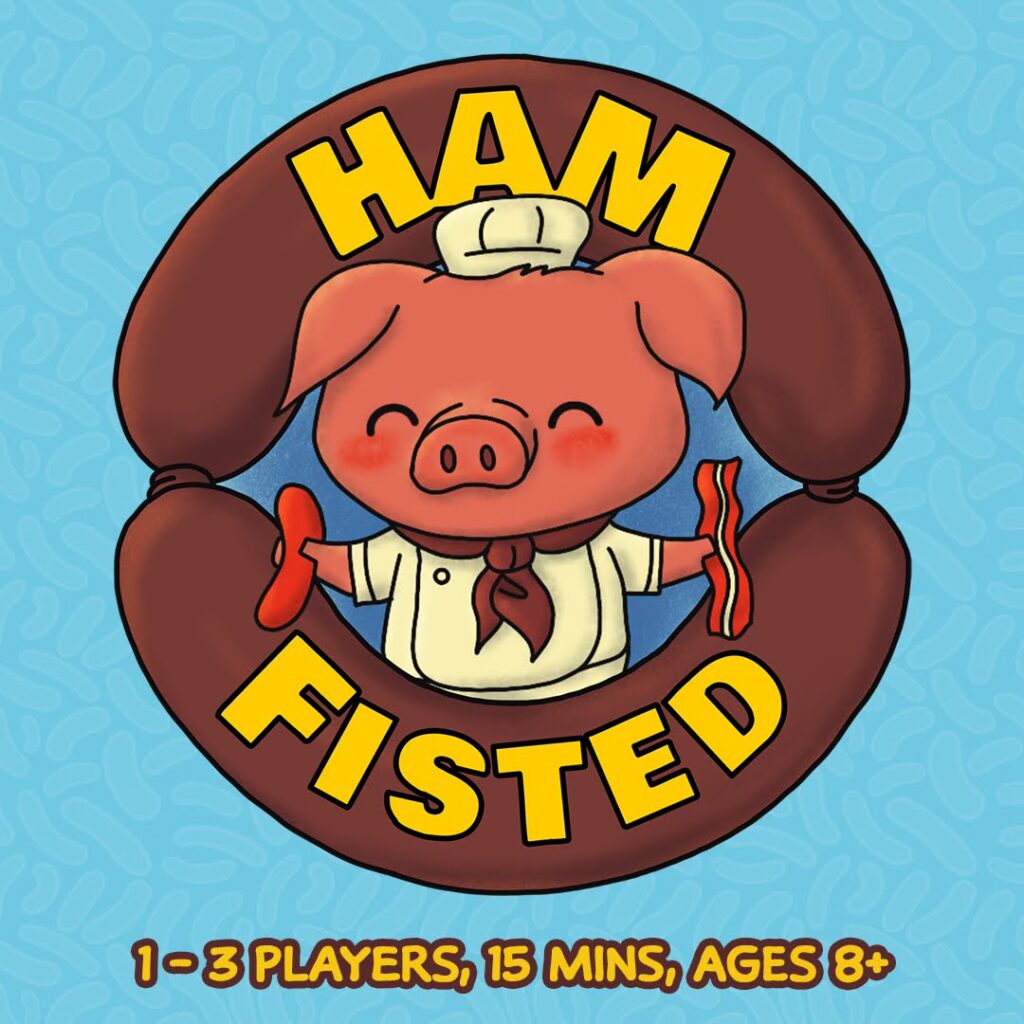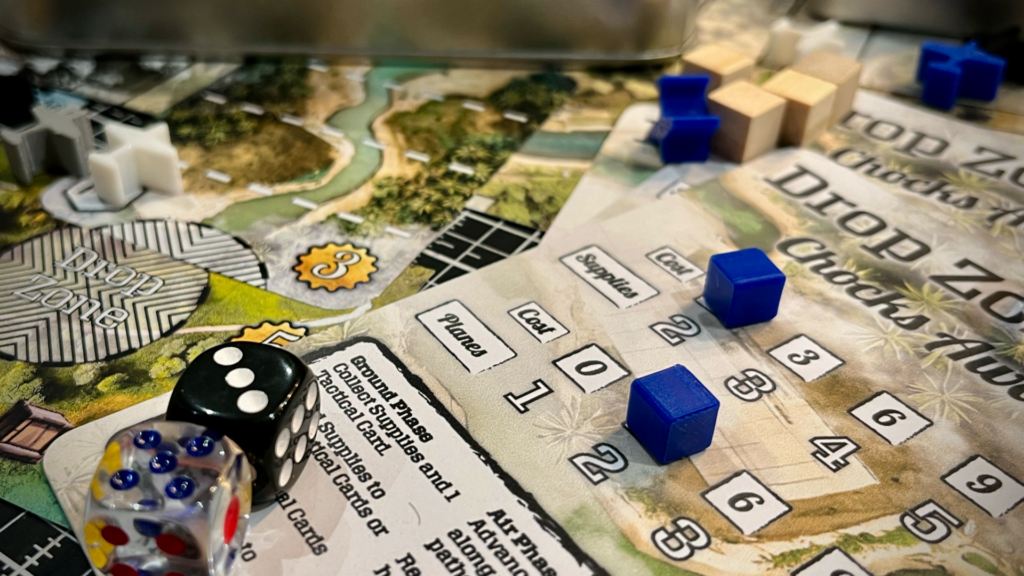
Writing this blog is too much fun! Incredible conversations each week that really dig deep into aspects of games design that I’ve never really thought about before. But each time you look beneath the surface, there’s so much more to the world of games design than you realise. This week I chat with Kev from Kev Makes Games about the importance of board game design competitions. Read and make sure to give Kev a follow!
Joe: hey Kev, welcome to the blog. First up, can you introduce yourself and tell us what brings you to the world of board games?
Kev: Thanks for having me! I’m a husband and dad of three, living and working in London. Over the years, I’ve worn a lot of creative hats—animator, graphic designer, developer, and UX designer—which has given me an eye for visuals and a love for problem-solving. Designing board games is relatively new for me, and it’s honestly one of the most rewarding challenges I’ve taken on.
My day job has evolved, creating games lets me use these skills. I get such a kick out of transforming an idea into something playable, fun, and engaging. Designing, illustrating, and iterating game ideas scratches a satisfying creative itch for me.
The board game community is incredible—full of passionate, clever, and supportive people from all backgrounds.
The design process is only part of the fun! The board game community is incredible—full of passionate, clever, and supportive people from all backgrounds. Every Tuesday, I get to join other designers at Playtest UK sessions at The Ludoquist in Croydon, where we share, test, and refine our ideas. Stumbling across the BoardGameProtoHype group on Instagram was such a happy accident, letting me connect with people worldwide who share a love of games – like yourself Joe! I was fortunate enough to attend UKGE and meet up with folks from the group, which was a massive highlight.
Joe: I’m so glad the group is such a positive experience! I wanted to catch up with you, as I saw your post this week about submitting a game to a Board Game Geek games design contest. I’ve already downloaded your game, and had a play, it’s brilliant. Can you first tell us a little about “One for Sorrow”, then we’ll explore the contests.
Kev: Thanks Joe! One for Sorrow is based on the 18th-century British nursery rhyme of the same name. The rhyme has always interested me with its mix of folklore and superstition around counting magpies, and I thought it would be an interesting basis for a game.
In the game, you play as one of the ancient Cunning Folk, practising magic to prevent an apocalyptic event known as the Eclipse of Time. You have a tribe of 13 magpies, each with a unique ability you can harness. You’ll need to arrange them in perfect order within the “ticking clock” of four seasons, avoiding Cursed Magpies that can bring about an early end.
As the theme is dark and magical, I’ve embraced a natural, sketchy, and etched design style. The colour pallet is simple, echoing the colours of magpies. In terms of gameplay, it’s a solo in-hand game. You can play without a table and on the move. There’s a mix of push-your-luck, memory, and hand management. I’ve played a lot of Galdor’s Grip and Palm Island, two fantastic games that have inspired gameplay elements within One for Sorrow.

Joe: I’ve played the prototype and really loved it, thanks for bringing it into the world.
One for Sorrow is going to be your entry into a BGG competition. I’m intrigued by those of us who design for competitions in this way. What makes you want to spend time designing for competitions?
Kev: Thanks so much! Entering the 2025 In-Hand Game Design Contest on BGG has been a great motivator to create, refine and share the game with a wider audience. Last year, I entered the same contest with a dexterity game called Ham Fisted, which did quite well, and I wanted to try something different this time.
I feel that entering contests brings a lot of benefits—they set the design space and deadlines, giving you a reason to push yourself toward a polished, finished product. I’ve entered several contests—solo, in-hand, and two-player—each with unique constraints and goals. As Leonardo da Vinci said, ‘Art lives from constraints and dies from freedom,’ which really applies here. Constraints like in-hand play, specific mechanics, or limited materials guide the design, making it both challenging and rewarding. Plus, I’m a fan of deadlines, so working through the various phases, from submission to voting, keeps things moving forward.
Competitions are also a great test of your rules-writing skills. Since you’re not there to explain the game, it’s a bit of a blind playtest each time a new person tries it out. Rough video walkthroughs are helpful initially, and I refine them as the rules develop and settle.

Available on PNPArcade https://www.pnparcade.com/products/ham-fisted
Feedback is also a huge part of the process. Contests require you to give feedback on other games, so there’s a real sense of collaboration. These contests are a fantastic opportunity to learn, share, and grow as a designer.
Joe: You’re really selling the idea of a competition! Is there any part of you that finds entering, and then potentially not winning, a challenge. I can imagine it might be difficult for some to put their ideas out there only to lose?
Kev: That’s a great question! The way I see it, there’s no real ‘losing’ in these contests. There are different categories, and having a game place in a top ten is always a nice bonus. My main focus is making something new, putting it out there, and seeing how it resonates with others. Like any game, some people will like it, and some won’t, and I’m okay with that. As long as I create something I enjoy, and if others connect with it, I consider that a win.
My main focus is making something new, putting it out there, and seeing how it resonates with others.
I’ve had to step back from a couple of contests when I couldn’t dedicate enough time to my game and provide feedback for others. That can be a bit disappointing, but the upside is that I can always return to those ideas later. I’ve never entered a contest expecting a game to come out number one in every category—it’s really about getting my work out there, learning, and hopefully connecting with people who enjoy playing the games I create. I get a huge kick from seeing someone print and play my game—it’s one of the best parts of sharing my designs!
Joe: this is ace, it’s great that it’s filling such a wonderful place in your games design world. One thing I’ve found challenging when explore the possible of entering a competition – the rules – looking on BGG, just the process of entering seems complicated enough. Do you have any thoughts on that and how to push past that initial “argh this is so complicated” moment?
Kev: Oh, I completely get that, Joe! It can feel like a lot at first. BGG competitions have their quirks, and with all the rules and different phases, it can feel like diving in at the deep end. But candidly, it’s much smoother sailing once you get through the first steps. The core rules and phases are practically the same across all contests, so once you’ve found a contest that interests you, here’s how to get started:
- Ensure your game hasn’t been available before the competition starts. This keeps things fair and gives everyone a level playing field.
- Create a post in the Work in Progress (WiP) area. You can start with just an idea!
- Submit your game to the competition thread. You can also ask questions, see what other designers are working on, and connect with the community. I’ve found it to be a friendly space, and there are people happy to help.
Once you’ve taken those first steps, you can share your work, get feedback, and refine things with input from other players.
Here’s a ‘Start Here’ link from the forums with useful links and information.
And if you’re not quite ready to dive in, a smaller step is to subscribe to a competition thread and ‘lurk’ to get a feel for the process. You never know; you might spot a game that sparks your interest in playing it and providing feedback.
Joe: ok that’s sounding less scary. I suppose my last question is about how you work up the bravery needed for that first step. A lot of us designers feel a sense of judgement when we create, and to create into a space that is specifically about judgement (a competition) multiplies that effect. You’ve sold the process brilliantly so far, but what would your advice be to those close to the edge but not ready to jump?
Kev: I feel that, Joe. Putting your work out there, especially in a contest setting, can feel intimidating!
Some of the best things I’ve done in life have involved stepping out of my comfort zone—like joining an in-person playtesting group for the first time. It felt daunting, but it’s opened up so many opportunities. When you create a game and put it out there, it will inevitably be judged. However, early feedback, whether positive or negative, is invaluable. It lets you see potential issues and decide whether or not to adjust for them.
I won’t sugarcoat it—some folks on the BGG forums can be pretty direct with their opinions. Some are better at giving structured feedback than others (how to provide good playtesting feedback is a topic for another day!). You must balance feedback with your game’s initial vision and purpose. Anchor yourself to how you want people to feel when they play it. Adapt as needed, but stay true to the core experience you want to create.
I won’t sugarcoat it—some folks on the BGG forums can be pretty direct with their opinions.
There are plenty of supportive voices for every critical voice, too. Most people genuinely want to help you improve, and even the harshest feedback often has a nugget of value you can use. My advice? See feedback as a tool, not a judgment of your skills. Take what’s useful, leave what isn’t, and keep moving forward.
Remember that the goal isn’t perfection but to enjoy the journey, learn from others, and connect with the community. It can feel like a big leap, but it’s worth it for the growth and connections you’ll gain along the way. Hopefully, I’ll see you in the competition forums!
Joe: thanks Kev. That’s really insightful. I’m fully sold on the idea now. That view of failure and criticism as part of the process and important is hard, but so important.
Final question, tell us a bit about what else your working on at the moment where can we find you and support your work?
Kev: Criticism and failure are tough to navigate, but they’re such valuable parts of the creative process. A mantra from my UX design days that I often lean on is, ‘Fail fast, fail cheap, fail often!’ It’s all about learning and iterating. I’m currently working on several different projects. Of course, One for Sorrow is still in development and available to print and play via its WiP thread on BGG. It’s been incredible seeing players try it out and provide feedback—you included!
I’m also expanding an older design, Infinity Rogue: Space Dungeon, my first competition entry in 2023. It’s a solo dungeon crawler that fits in a tin, combining push-your-luck mechanics with deck-building elements. The expanded version will include new bosses, traps, and a few surprises!
Another WiP game is Dirty Tricks, which is about 99% there. It’s a trick-taking game where the winner moves on a score track based on the total points scored from the card values. The twist? The cards range from -4 to +4, and players can manipulate the total, leading to strategic sabotage.
You can find me on Instagram at @KevMakesGames, where I share updates about my designs, playtesting insights, and behind-the-scenes glimpses into game development.
If you’d like to support my work, the best way is to check out my games—some are available on itch.io and PNPArcade. You can find links to everything on my website: KevMakesGames.com.
Thanks again for having me, Joe—it’s been an absolute pleasure chatting!
Thank you Kev! Readers go and seek Kev out on Instagram, and then find and play some of his quite brilliant games. Make sure you go and find the playtest versions of “One for Sorrow”. Once you’ve done all that subscribe below to make sure you’re the first to know when a new blog post is live!



Another great blog Joe, many thanks to you and Kev for sharing! I’m definitely sold on entering competitions now aswell!